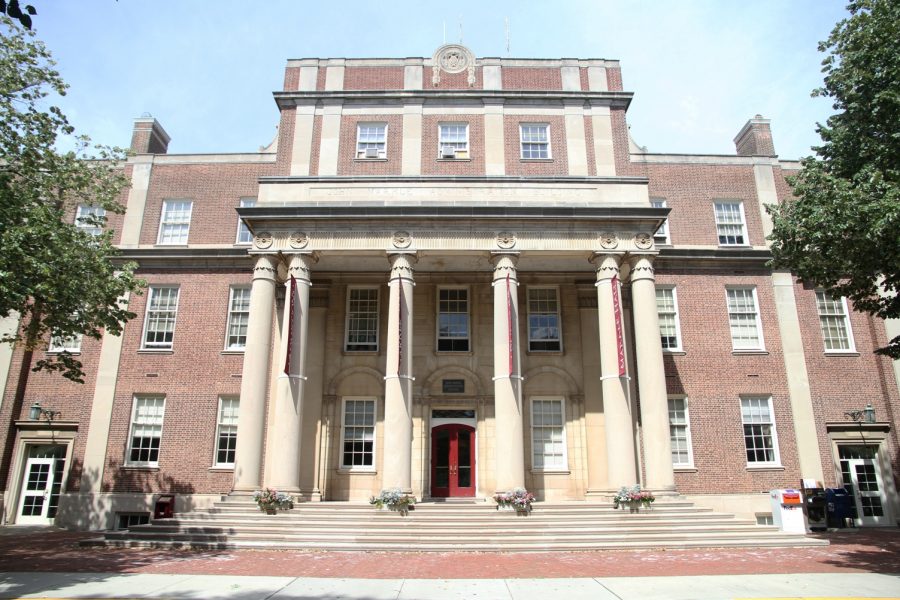Faculty voted overwhelmingly to urge the board of trustees to uphold the tenure review committee’s recommendation to grant professor Juan Rojo tenure in a special faculty meeting Tuesday, several sources confirmed.
Sources confirmed that attendees were told they could face serious sanctions if they discuss the contents of the meeting, even with their spouses. The potential penalties for speaking are unclear.
In the meeting, several sources confirmed that a motion was passed 121-35 to urge the Lafayette College Board of Trustees to affirm the recommendation of the Promotion, Tenure and Review (PTR) committee on Rojo’s tenure. Seven attendees abstained, sources confirmed.
All this comes after Rojo’s hunger strike against his tenure denial, which received national attention. Although his two demands – that the PTR committee’s recommendation to grant tenure be upheld and systematic changes be made to the tenure review process – were not yet met, he ended his strike on Monday morning.
Multiple sources confirmed that the discussion in the meeting extended beyond Rojo’s case and included larger concerns about faculty governance and the president’s role in the tenure review process.
The board of trustees is the only group at the college that can grant tenure.
“Given the urgency of the situation and the continuing damage being done to the college’s reputation, we urge the board to act expeditiously,” the motion read.

For “[m]ore detailed information and explanation,” the motion’s rationale section refers to a letter, signed by 118 faculty members, sent to the board on Sunday. Thirty-three signatures on the letter are anonymous, because those faculty – some tenured – expressed concerns about their careers at the college, according to the letter.
The two-page letter extends the case of the motion’s rationale, adding that there were “important procedural errors” made in Rojo’s tenure application. The alleged procedural errors include how the president interpreted her role in the tenure review process.
After a unanimous endorsement from Rojo’s department, the PTR committee voted 6-1 to recommend he be granted tenure. In March, President Alison Byerly informed Rojo that she did not concur with the committee’s decision. There is no appeal process when the president does not concur, and a denial of tenure means the professor loses his or her job.
According to the faculty handbook, the president “should concur” with the department’s and the PTR committee’s recommendations “except in rare instances and for compelling reasons which should be stated in detail.” “Compelling reasons” is not defined in the handbook.
“Instead of new information or unusual, extraordinary, compelling circumstances, President Byerly merely reached a different assessment of the merits of the case, focusing on the candidate’s teaching performance and especially on comments written on student evaluations, which researchers have found to be a biased source, particularly for women and/or faculty of color,” the letter reads.
The letter cites a 1993 American Association of University Professors (AAUP) report that defines “compelling reasons” as a reason that “involves more than disagreement with faculty judgment but is not one that virtually commands a decision.”
The motion’s rationale passed in the faculty meeting on Tuesday reads, “There is no doubt that the ‘rare and compelling’ standard our Faculty Handbook includes is [sic] what the American Association of University Professors has defined.”
In an 11-paragraph, campus-wide memo sent on Monday, Byerly wrote that Rojo’s case “unfolded in accordance with the process as written.”
Byerly cites the same 1993 AAUP report in her memo, writing that language in the report “may provide a valuable context for considering future clarification of the term.”
She declined comment on her definition of “compelling reasons” in an interview Tuesday afternoon.

The faculty handbook lists teaching as “the most important criterion” for tenure decisions. Byerly’s four-page letter to Rojo in March explaining her decision not to concur with the PTR Committee’s vote focused on Rojo’s student evaluations.
“I found myself largely in agreement with the PTR committee’s characterization of the candidate’s teaching,” she wrote in her campus-wide memo. “Where we differed is that I could not concur with their conclusion that the record described met the standard of distinction and the elements of quality teaching outlined in the Faculty Handbook (4.2.1).”
She also wrote that she asked to meet with the PTR committee “to seek clarification of their views” but the committee declined because “such a meeting is not explicitly indicated in the handbook.”
“As I have said, there are aspects of the process outlined in 4.1.3 that I believe can be improved in the interests of expediency and increased clarity about the steps taken when the president does not concur with the PTR committee and the decision is referred to the Board,” she added in the memo, referring to the handbook’s clause regarding the president’s role in determining promotions.
Byerly declined further comment on her campus-wide memo, Rojo’s tenure case or the tenure process. When asked about criticisms that her administration lacked transparency, she also declined comment.
Byerly and Rojo would not comment on Tuesday’s faculty meeting because of its confidentiality.
Tuesday’s meeting was held in executive session, a strictly confidential meeting only open to voting members of the faculty. Typically, Clerk of the Faculty Robert Root said that a faculty meeting only goes into executive session at the last faculty meeting of the year, and it is “generally a formality.”
The faculty governance committee made plans at their meeting last Friday to commission an ad hoc committee to look at what happens when the president disagrees with the PTR committee’s decision, said Root, who is also a member of the faculty governance committee. Whether or not this ad hoc committee will be created will most likely be voted on in the next faculty meeting in October, he added.
Ian Morse ‘17 contributed reporting.






































































































